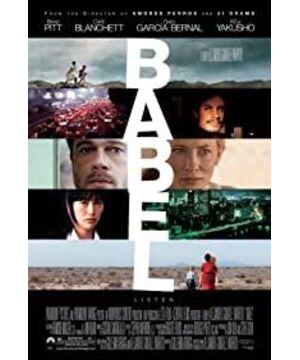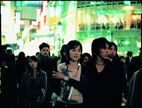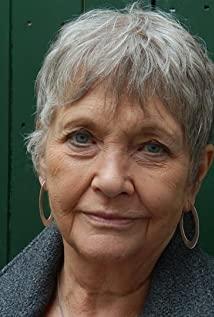The film’s narrative is said to inherit the director’s usual style. The plot is very compact, but it is also a little messy: three very different regions, four relatively independent but related events, and the context of time has been deliberately distorted by the director. , Which directly leads to not very smooth understanding. As the lens drifted away in the blurred night scene of Tokyo, the director left a sentence "the darkest night, the brightest light" and my face was blank: in the nearly 150-minute film, the Japanese This section seems to be in a free state all the time. Despite the fact that the shotgun is a prop or clue that links several events together, this section about "rebellious teenagers" does not seem to be intrinsically connected to the other parts.
There should always be an answer to doubts, so I tried to find some film reviews on the Internet. After all, it is normal for me to be unable to comprehend it with my understanding. After reading a few articles, I was finally disappointed. There were a lot of introductions one after another, but I didn't see any comments that were more ironed. But as I looked for it, I had some ideas of my own.
The cause of the relationship crisis between Richard and Susan was the death of their youngest son Sam. At the edge of life, they finally had a brief but direct and clear real communication, and the grudge was relieved. In fact, at the beginning of the film, their daughter Mary mentioned it, but the communication between the couple has never been involved in the narrative of the film, even though they all know that the source of the contradiction is here. So, is it also because of Chieko's deafness that finally led to her mother's suicide? At the same time, is it because Yasujiro has never been able to reach a thorough understanding that Yasujiro tried to "calm down" himself by traveling to Morocco just like Richard? If you look at these two stories in parallel, it seems that you can say so. Before the shooting accident, Richard and Susan had been trying to relax and calm down, but the trauma in their hearts kept them from avoiding the real problem.
Taking this as an entry point to review the entire film again, what I rediscovered is a magnificent picture that tells one story after another from country, race to individual’s inner heart. All themes are "communication", and the language itself does not It is not the crux, what people need is a higher level of spiritual communication. This kind of weather may not be smaller than when people built the Tongtian Pagoda.
First, let’s take a look at the narrative of the movie. As Chieko grew up, Yasujiro gradually had conflicts with his wife because their daughter was unable to integrate into society because of his deafness and muteness. In order to calm his heart and heal the cracks in his wife's heart, he chose to go hunting alone in Morocco. At the end of the trip, he thanked the locals. Hassan, the tour guide, gave him his shotgun. Or, does this also imply that Aziz’s trip did not achieve the expected purpose of calming his heart? Unable to communicate and mediate, Yasujiro's wife finally chose to commit suicide, leaving behind the father and daughter who still lacked communication.
Three years later, Richard and Susan in the United States were unable to forgive themselves and each other because of the sudden death of their youngest son Sam. At Richard's insistence, the two went to Morocco for a holiday with the same purpose as Ajiro. During the trip, Susan was unfortunately injured by the curious shepherd boy Ahmed and Joseph (Yussef) brothers. The shotgun used was given to Hassan by Ajiro and then sold to the boy’s father Abdullah. . After timely assistance from the Moroccan and American governments, Susan was finally out of danger.
At the same time, Richard’s nanny Amelia (Amelia) is preparing to return to Mexico to attend her son’s wedding, but Rachel, who was planning to take care of her child after the shooting, needs to help Richard contact the U.S. government to rescue the injured. Susan. After seeking help everywhere to no avail, Amelia took the two children back to her home in Mexico. After the wedding, Amelia's nephew Santiago (Santiago, San Diego) sent them home, but when they were crossing the border, they were made things difficult by American officials, and eventually angered Santiago, who forcibly rushed through the checkpoint. In order to avoid being chased by the police, Amelia and her two children were thrown in the middle of the desert and were eventually rescued by the police.
On the other side of the globe, Chieko ran into the referee and her team lost the volleyball match. After the game, she took the insulting faith in the locker room and was discriminated against due to deafness and dumbness when she was approached by others, which made her really seek sexual relief. In order to confirm that the shotgun used in the shooting was indeed gifted to Hassan by Yasujiro, the police officer Kenji Mamiya found Chieko. Unexpectedly, Chieko had a good impression of him, and therefore made a decision when he was self-exiled: Go back home and dedicate himself to Officer Mamiya. Although the police officer Mamiya rejected Chieko's behavior, the problem in her mind was finally resolved through textual communication. The movie ends in an act of embracing the father and daughter of Yasujiro and Chieko, which signifies the return of family affection.
Chieko's rebellious behavior in the film, apart from Japan's special cultural environment, was caused by jokes aroused by classmates, and people's discrimination and prejudice against the deaf and mute made her gradually go to extremes, until she was on the verge of complete exile in the disco. The director used a longer space to repeat the lights and crowds of Lu Li in the disco, and constantly switched between the intense music and the silence that Qianezi could feel. Finally, a slight touch in his heart made Qianezi walk out of the disco and return home. Get police officer Mamiya. Through her description of her mother's suicide to Mamiya, it is conceivable that this should be the way she had imagined to end her life and the loneliness and helplessness she had faced countless times when the city was shining neon. We have no way of knowing what Chieko wrote on the last piece of paper that Chieko wrote to Mamiya, but from the description of the film, we can know that the communication between the two people is sincere and profound. Chieko has received unprecedented care and warmth-different from Her vision, this is a heart she never thought of and understood with her young heart. At the end, the handshake and embracing of the father and daughter Yasujiro let us see the strength, but after reading the note, Officer Mamiya stretched his face a little and then dropped his eyes, leaving the audience with the weight of just solving the case...
The story of Richard and Susan mainly focuses on the exchange and return of personal emotions. Chieko's experience was triggered by discrimination and indifference to the disabled in the social environment and resolved by the police, a character with a special status symbol. From the individual to the society, the stories that happened to the nanny Amelia and his nephew Santiago reflect the differences and prejudices between the wider countries and nations. What Mike and Mary saw in Mexico was a society and life scene completely different from that of the United States. The huge difference in infrastructure and living standards and the bloody transmission of Santiago’s killing of chickens are the basis for the existence of prejudice. Similarly, Susan is picky about restaurants, and other passengers are extremely wary of villagers, and so on. In the end, this prejudice caused the US border checkpoint officials to make things difficult for Santiago in the film, which directly caused Amelia and her two children to get lost in the desert. In the end, the ending of the story is not entirely tragic, but Amelia's deportation shows that the prejudice between such countries cannot be eliminated for a while.
At the same time, the director expressed his criticism of the U.S. anti-terrorism policy and ridiculed politicians through the reasons for the delay in rescue, undoubtedly revealing an important reason for the existence of such differences and prejudice: the government deliberately misled the people out of the so-called national interests. .
But we can still see hope. Susan accepted the guide Anwar's grandmother using soil smoke to relieve her pain, and calmed down with the old man's prayers-the differences in race, language, background, etc. were dissolved under the inspiration of kind nature. But this kind of exchange is more like a kind of tolerance and compassion, and the Americans who represent modern civilization are the recipients—obviously, this is far from enough.
Among the four stories, the shepherd boys Ahmed and Yussef, who exist as clues, are the only tragedy. The brothers are a window to the ordinary life in Africa and a thorough explanation of the truth about the shooting incident. Perhaps this is the basis for rebuilding the "Tongtian Tower" proposed by the director?
Understand, communicate, understand.
View more about Babel reviews









